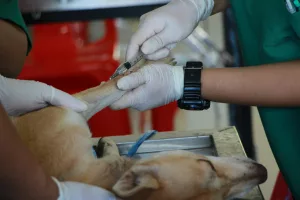Spaying is an essential procedure in managing the pet population and promoting the health of female dogs. While many pet owners understand the primary benefits of spaying, there’s often confusion about the possibility of a spayed dog becoming pregnant. To shed light on this topic, let’s delve deeper into the spaying process, its effectiveness, and the rare instances that might lead to misconceptions about pregnancy post-spaying.
Understanding the Spaying Process
Spaying, also known as an ovariohysterectomy, is a routine surgical procedure performed by veterinarians to remove a female dog’s ovaries and usually the uterus. The removal of these reproductive organs prevents the dog from going into heat and eliminates the possibility of pregnancy. The procedure is typically done under general anesthesia, and most dogs recover quickly with minimal complications.
The Surgical Procedure
During the surgery, an incision is made in the dog’s abdomen to access the ovaries and uterus. The veterinarian carefully removes these organs, ensuring no ovarian tissue is left behind. The incision is then sutured, and the dog is monitored as she wakes from anesthesia. Post-operative care is crucial and includes monitoring for signs of infection, keeping the incision site clean, and restricting the dog’s activity to promote healing.
Post-Operative Care Tips
- Monitoring the Incision: Check the incision site daily for redness, swelling, or discharge. These could be signs of infection.
- Activity Restriction: Limit your dog’s activity to prevent stress on the incision. Short, controlled walks are usually recommended.
- Pain Management: Follow the veterinarian’s instructions for pain relief medication. Never administer human pain medications to dogs.
- Preventing Licking: Use an Elizabethan collar (cone) to prevent your dog from licking the incision, which can cause infection.
- Follow-Up Visits: Attend all scheduled follow-up visits to ensure the incision is healing properly and to remove any sutures if necessary.
Preparing for Spaying
Before scheduling a spay surgery, there are several considerations to ensure your dog is ready for the procedure:
- Age and Health Assessment: Generally, dogs can be spayed from as young as eight weeks, but it’s commonly done around six months. Consult your vet to determine the best time based on your dog’s health and breed.
- Pre-Surgery Instructions: Follow any pre-operative instructions given by your vet, such as fasting, to ensure a safe procedure.
- Behavioral Preparation: Familiarize your dog with wearing a cone ahead of time to reduce post-surgery stress.
Effectiveness of Spaying
When performed correctly, spaying is nearly 100% effective in preventing pregnancy. The removal of the ovaries and uterus eliminates the source of eggs and the site for embryo implantation, making it impossible for fertilization and pregnancy to occur.
Ovarian Remnant Syndrome
One of the rare complications that can occur post-spaying is ovarian remnant syndrome. This condition arises when a small piece of ovarian tissue is inadvertently left behind or if there is ectopic ovarian tissue. The remaining tissue can continue to produce hormones, leading to signs of estrus (heat) in the dog.
Case Study: Bella’s Unexpected Heat
Consider Bella, a mixed-breed dog who was spayed at eight months old. A year later, she began exhibiting signs of being in heat, such as a swollen vulva and increased attraction to male dogs. Her concerned owner took her to the vet, who diagnosed ovarian remnant syndrome after thorough examination and hormone testing. A second surgery successfully removed the residual ovarian tissue, resolving the issue.
Preventing Ovarian Remnant Syndrome
- Choosing an Experienced Veterinarian: Select a vet with extensive experience in spaying to minimize the risk of complications.
- Post-Operative Monitoring: Stay vigilant for any signs of heat after spaying, and consult your vet if symptoms appear.
Misdiagnosis of Spaying Status
In some cases, a dog believed to be spayed might not have undergone the procedure. This can happen due to miscommunication, clerical errors, or assumptions about a dog’s spaying status, especially in rescue or shelter scenarios.
Ensuring Your Dog is Spayed
- Veterinary Records: Always request and keep a copy of your dog’s medical records, including spaying documentation.
- Hormone Testing: If there’s any doubt, a veterinarian can perform a blood test to check for reproductive hormones, confirming whether the dog has been spayed.
- Physical Examination: An ultrasound can be used to check for the presence of reproductive organs if there is uncertainty.
Common Scenarios Leading to Misdiagnosis
- Adoption from Shelters: Ensure that any dog adopted from a shelter has verifiable spaying documentation.
- Miscommunication with Previous Owners: When acquiring a dog from a private party, confirm spaying status through veterinary records rather than relying on verbal confirmation.
Pseudopregnancy in Spayed Dogs
Pseudopregnancy, or false pregnancy, is a condition where a spayed dog may exhibit symptoms similar to pregnancy, such as nesting behaviors, lactation, and abdominal swelling. This phenomenon is due to hormonal fluctuations and does not indicate an actual pregnancy.
Managing Pseudopregnancy
- Behavioral Support: Provide comforting and consistent care to reassure your dog during this confusing time.
- Veterinary Consultation: If symptoms are severe or prolonged, consult your veterinarian for advice and potential treatment options.
- Avoid Encouraging Behavior: While it might be tempting to indulge your dog’s nesting instincts, avoid reinforcing the behavior to help her return to normal.
Long-Term Management
- Monitoring Hormonal Changes: Be vigilant about any recurring symptoms and maintain regular vet checkups to manage hormonal health.
- Diet and Exercise: Maintain a balanced diet and exercise routine to support your dog’s overall health and help mitigate symptoms.
Comprehensive Benefits of Spaying
Spaying offers a range of long-term health and behavioral benefits beyond pregnancy prevention. Understanding these benefits can help pet owners make informed decisions about their pets’ health.
Health Benefits
- Cancer Prevention: Spaying significantly reduces the risk of mammary gland tumors, which are malignant in about 50% of dogs, and eliminates the risk of ovarian and uterine cancers.
- Pyometra Prevention: This life-threatening uterine infection is completely prevented by spaying.
Behavioral Benefits
- Elimination of Heat Cycles: Spayed dogs do not experience the hormonal and behavioral changes associated with heat, such as mood swings and bleeding.
- Reduction in Aggression: Many spayed dogs exhibit less aggressive and territorial behaviors.
- Lowered Roaming Instincts: Without the drive to find a mate, spayed dogs are less likely to roam, reducing the risk of accidents and getting lost.
Community and Environmental Benefits
- Population Control: Spaying helps control the pet population, reducing the number of unwanted animals in shelters.
- Reduced Stray Population: Fewer stray animals contribute to a decrease in wildlife impact and community disruption.
Addressing Common Concerns About Spaying
Despite the clear benefits, some pet owners have concerns about spaying, including fears about weight gain and changes in personality.
Weight Management Post-Spaying
It’s a common myth that spaying causes weight gain. While spaying can slow a dog’s metabolism, weight gain is typically due to overfeeding and lack of exercise. Maintain a balanced diet and regular exercise to keep your spayed dog healthy.
Practical Tips for Weight Management
- Portion Control: Measure your dog’s food to ensure appropriate portions and avoid overfeeding.
- Regular Exercise: Engage in daily walks, playtime, or agility training to keep your dog active and healthy.
- Monitor Weight: Regularly weigh your dog and consult your vet for dietary adjustments if necessary.
Personality Changes
Some owners worry that spaying will alter their dog’s personality. While spaying can reduce certain behaviors related to heat, it doesn’t change a dog’s fundamental personality. Most dogs remain playful, affectionate, and loyal after spaying.
Managing Expectations
- Understanding Behavioral Changes: Recognize that any behavioral changes post-spaying are typically positive, such as reduced aggression or anxiety.
- Maintaining Routine: Keep a consistent routine with your dog to support a stable environment post-surgery.
Myths and Misconceptions About Spaying
There are numerous myths surrounding spaying that can confuse pet owners. It’s crucial to separate fact from fiction to make informed decisions.
Common Myths
- Myth: Spaying is Unnatural: While it’s a human intervention, spaying is a responsible choice for managing pet populations and preventing health issues.
- Myth: Spaying is Painful: With modern veterinary practices, spaying is a routine procedure with effective pain management to ensure your dog’s comfort.
Debunking Myths
- Veterinary Expertise: Consult with your veterinarian to understand the procedure, pain management, and recovery process to alleviate any concerns.
- Research and Resources: Utilize reputable sources and resources to educate yourself on the benefits and realities of spaying.
Long-Term Health Monitoring
Post-spaying, it’s essential to continue regular veterinary checkups to ensure your dog’s overall health and well-being.
Routine Health Checks
- Annual Examinations: Regular checkups help monitor your dog’s health and catch any potential issues early.
- Vaccinations and Preventatives: Keep up with vaccinations and parasite preventatives to protect your dog’s health.
Monitoring Behavioral Health
- Observe Changes: Pay attention to any significant behavioral changes and consult your vet if you have concerns.
- Mental Stimulation: Provide mental stimulation through toys, training, and social interaction to keep your dog engaged and happy.
In the realm of responsible pet ownership, spaying is a cornerstone procedure that offers numerous benefits. While the chance of a spayed dog becoming pregnant is exceedingly rare, understanding the nuances of the procedure and its potential complications helps clarify misconceptions. By choosing to spay your dog, you not only prevent unwanted litters but also significantly enhance her overall health and quality of life. For any concerns about your dog’s spaying status or health, consult with your veterinarian to ensure your furry friend receives the best care possible.




